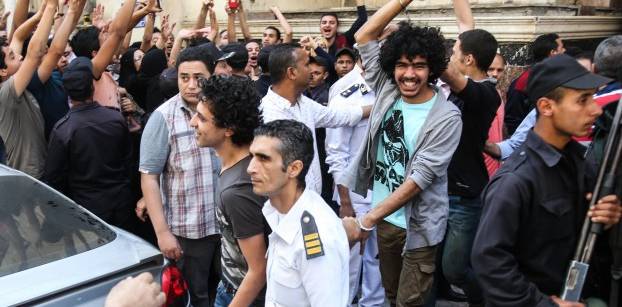Egyptian court acquits another batch of islands protesters

Protesters opposed to an Egyptian-Saudi maritime border demarcation agreement that requires Egypt to cede control over two Red Sea islands to Saudi Arabia, April 15, 2016. ASWAT MASRIYA / Mohamed al-Raei
CAIRO, Jun 14 (Aswat Masriya) – An Egyptian court acquitted on Monday 51 persons of charges pertaining to protests held in April against the president’s decision to transfer two strategic Red Sea islands to Saudi control.
A Saudi-Egyptian maritime border demarcation agreement stirred up controversy in Egypt when it was signed in April, with critics accusing President Abdel Fattah al-Sisi of “selling Egypt’s land” in return for Saudi aid. The agreement, which has yet to be ratified by the parliament, stipulates that the islands of Tiran and Sanafir will fall within Saudi territorial waters.
The defendants acquitted on Monday were among 270 persons that the interior ministry said were arrested on April 25 in Egypt’s capital, Cairo, and neighbouring Giza, on charges such as inciting protests, protesting without permission from the ministry and “disturbing public peace”.
Today's ruling, issued by the Qasr al-Nil Misdemeanour Court, may be appealed by the prosecution.
The controversial demarcation agreement prompted thousands of Egyptians to take to the streets in rare protests on April 15 and April 25, amid a police campaign of mass arrests of activists opposed to the islands’ transfer.
String of court cases
Tens were fined or handed down prison sentences that ranged from two to five years in a string of court cases related to the protests. Most recently, a court sentenced on Saturday seven defendants to eight years in prison each and fined them.
Also a number of defendants were acquitted or released in other court cases related to April's protests. On June 4, an appeal court revoked a two-year prison sentence previously handed down to 33 defendants. A five-year sentence issued against 47 other defendants was cancelled on May 24 by another appeal court.
Protest law
Protesters opposed to two islands’ transfer defied a protest law that was issued in 2013 and widely criticised by Egyptian and international human rights groups, because it requires assembly organisers to notify the interior ministry of their plans in advance, granting the ministry the right to cancel protests. The law sets prison sentences ranging between two and five years for those who violate it.
President Sisi had defended his decision to hand over the two islands, saying in a televised speech in April that "Egypt does not sell its land to anyone and it does not take anyone's land."
The cabinet, which signed the agreement, argued in a statement in April that the islands are Saudi, adding that Saudi Arabia requested Egypt to protect them in 1950 and they had been under Egypt's control since.









facebook comments